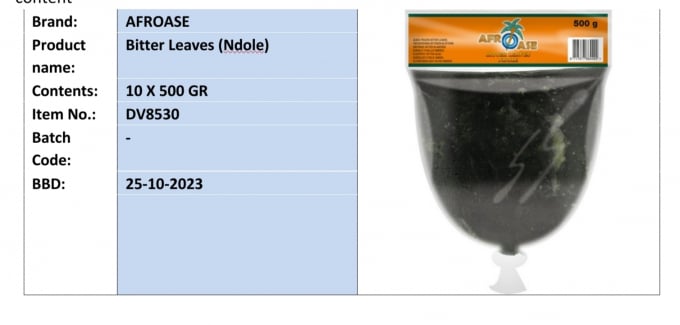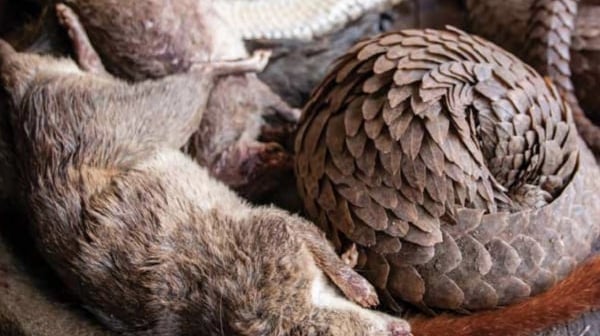May 29, 2025 | 09:28 GMT +7
May 29, 2025 | 09:28 GMT +7
Hotline: 0913.378.918
May 29, 2025 | 09:28 GMT +7
Hotline: 0913.378.918
According to the Vietnam Sanitary and Phytosanitary Notification Authorities and Enquiry Point (SPS Vietnam Office), RASFF - Rapid Alert System for Food and Feed of the European Union (EU) has just sent a warning notice, stating that the product of frozen ground bitter leaves of An Van Co., Ltd. Thinh (Address: 60 Ly Thuong Kiet, Ward 1, Bao Loc City, Lam Dong Province) was found to have exceeded the maximum residue level (MRL) of many active ingredients and banned substances.

The product of frozen ground bitter leaves receives warning from the EU.
In which, some active ingredients have high residue levels such as: Thiamethoxam (54 mg/kg); Tebuconazole (26 mg/kg); Propiconazole (34 mg/kg); Diniconazole (86 mg/kg).
The country issuing the notification is the Netherlands, which has notified the consignee. Finland has initiated the recall of the product.
In addition to frozen ground bitter leaves, Vietnam has also received warning on tea exported to Hong Kong. This product contains three banned substances and pesticide residues exceeding EU regulations, including: Chlorfluazuron (0.11 mg/kg); Imidacloprid (0.15 mg/kg) and Chlorpyrifos (0.043 mg/kg).
Being the focal point for transparent information about SPS measures and regulations to WTO members, the Vietnam SPS Office has notified this issue to the Plant Protection Department and related units.
At the same time, the SPS Vietnam Office suggested the authorized agencies direct the inspection and request the manufacturers of the mentioned products to review the stages to determine the causes and remedial measures.
According to Dr. Ngo Xuan Nam, Deputy Director of SPS Vietnam Office, there were 2,251 warnings from the EU's rapid warning system for agricultural products, food and animal feed in the first six months of the year. Amongst them, 40 warnings were for Vietnamese agricultural products accounting for 1.77 per cent.
Particularly, nine warnings of them were for Vietnamese vegetables, accounting for 22.5 per cent. The warnings focus on violations of pesticide residue levels exceeding EU regulations, with only one warning of sensory violation and one warning of violation of aflatoxin during preliminary processing.
For example, rambutan exported to the Netherlands was contaminated with the pesticide chlorpyrifos at 0.022 mg per kilogram while the maximum allowable residue level is 0.01 mg per kilogram; therefore, all the fruit had to be destroyed.
Additionally, frozen red peppers in the Netherlands had the residue of cadmium at 0.28 mg per kilogram and insecticide chlorpyrifos at 0.14 mg per kilogram, chlorfenapyr at 0.23 mg per kilogram, and banned substance permethrin at 0.22 mg per kilogram.
Moreover, the batches of chili sauce products shipped to the Republic of Cyprus were also destroyed because they contained banned substances E 110 - Sunset Yellow FCF and E124 - Ponceau 4R/cochineal red A.
“Domestic enterprises exporting agricultural products and food to the EU market must standardize the raw material area, strictly supervise the production process, and ensure the harvest time and the processing stages comply with the recommendations of the management agency,” said Dr. Ngo Xuan Nam, Deputy Director of SPS Vietnam Office.
“Enterprises’ violations of EU regulations will affect efforts to remove the inspection frequency of Vietnamese agricultural products of plant origin into the EU, as a breach of a business will affect others,” he added.

In addition to frozen ground bitter leaves, the EU also warns that some Vietnamese chili products contain substances exceeding the allowable residue level.
In case the product is at risk of contamination or excess residue, the Deputy Director recommended businesses to immediately review and check the production carefully. In addition, the purchase of products from farmers and traders should also be recorded and the farming process should be closely monitored to ensure that it meets the requirements of the importing country.
Previously, on July 8, Norway also sent a warning notice about the pangasius filet product of a company in Ho Chi Minh City as it contained banned substances -leucomalachite green and malachite green.
Recently, the Ministry of Agriculture and Rural Development has held a working session with the EU Commissioner for Agriculture to promote mutual cooperation and trade in agricultural products. At the meeting, the EU Commissioner for Agriculture highly appreciated Vietnam's compliance with SPS regulations under the EVFTA framework, as shown by making a list of facilities in the production chain and implementing the principle of material zoning.
The EU Commissioner for Agriculture also emphasized that SPS-related issues are the most important factor to promote trade cooperation between the two sides.
Translated by Phuong Ha

(VAN) Bamboo products from Thang Tho Bamboo Cooperative have reached many countries around the world, while also creating jobs for local workers.

(VAN) The Management Board of Con Dao National Park reported that a green sea turtle, tagged in the Philippines, has traveled thousands of kilometers to lay 84 eggs on Bay Canh Islet.

(VAN) Green technology is paving a new path for sustainable aquaculture in the Mekong Delta in particular and across the country in general, helping reduce emissions and adapt to climate change.

(VAN) On May 27, La French Tech Vietnam (the French startup and innovation community in Vietnam) held the French Tech Summit Vietnam 2025.
/2025/05/27/4731-2-223159_980.jpg)
(VAN) No votive paper, no styrofoam, no plastic bags, no plastic bottles, and no single-use plastic trays are the key rules tourists should keep in mind when visiting Con Dao.

(VAN) In the fight against plastic pollution, Vietnam has been demonstrating a proactive, pioneering, and active role in addressing the greatest environmental challenge today.

(VAN) The WOAH guidelines provide a vital tool for risk chain analysis, covering the extraction, transportation, consumption, and handling of confiscated wildlife.